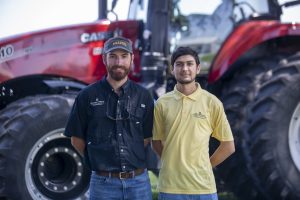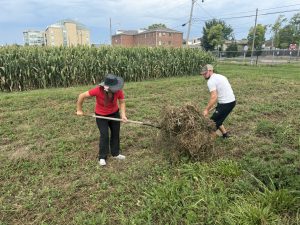This summer, seven students from Uzbekistan worked alongside a variety of College of Agriculture, Food and Natural Resources’ (CAFNR) faculty as interns, learning valuable insights and broadening the horizons of their mentors along the way.
Uzbekistan is a landlocked, central Asian country that was formerly part of the Soviet republic. The interns, who are all students at Tashkent State Agrarian University and spanned undergraduate to Ph.D. levels, were stationed at research farms that are part of the Missouri Agricultural Experiment Station (MOAES).

“I really enjoy learning from other cultures,” said Justin Calhoun, assistant extension professor in the Division of Plant Science and Technology. “I have had the opportunity to travel and meet many people from many places and it is always a pleasure to understand how other cultures do life differently. So, getting the opportunity to bring interns here allows me, students in my program, staff here at the Fisher Delta Research, Extension and Education Center (FD-REEC), and the public around us the chance to diversify our friend groups and connect with other cultures.”
Calhoun is based at FD-REEC in Portageville, MO., as a soil and cropping systems specialist, and he mentored one of the interns over the summer, Bekhzod Khayrullaev. Khayrullaev is an undergraduate student, and helped Calhoun plant and tend to his research plots this summer. Kayrullaev is extending his stay through the fall as he was hired to assist researchers in MU’s soybean breeding program.
CAFNR International Programs helped facilitate these internships through a relationship with Tashkent State Agrarian University built on a previous US Agency for International Development grant in which CAFNR’s Division of Applied Social Sciences helped build an agribusiness curriculum for the university. That project and the resulting relationship were supported largely by the work of Kerry Clark, CAFNR director of International Programs.
“Kerry went way above and beyond for these folks (the interns),” said Andy Thomas, associate research professor in the Division of Plant Science and Technology who mentored two of the interns at the Southwest Research, Extension and Education Center (SW-REEC). “She took a strong and very personal interest in the well-being of each student. Her commitment to not only pulling this off, but making it a tremendous experience for all of us was amazing!”
Aygul Mynbaeva, one of Thomas’s mentees, is an undergraduate student in Uzbekistan who came to the US to be exposed to new and different agricultural practices compared to those in her home country. She noted that she was able to see an autonomous tractor at work for the first time, but she also learned life lessons that go beyond the field.
“I saw a lot of plants that were new to me,” Mynbaeva said. “Pawpaws, elderberry, black walnut — all of that is new for me, but I will also remember our leader, Jay (Chism, director of SW-REEC). Jay was an excellent leader, and I think I will model how to lead after him.”
Zarina Khurramova is a Master’s student, and she also worked with Thomas to gain insight to deepen her own research that aims to eliminate food waste in agriculture.
“We worked especially with elderberries, and that was a good learning tool for me because there is no waste with elderberries,” Khurramova said. “You use all of the parts of elderberries in processing.”
Khurramova said this internship program was highly competitive at her school, and her experiences were incredibly valuable.
“The interns come here to learn from us, but it is 100% a two-way learning experience,” Thomas said. “The students, staff and faculty here at the Southwest Center learned just as much from the interns as they learned from us, and I find it very rewarding that my students and staff now have social media friends across the globe.”

Other interns who participated in the program were:
- Zukhra Nurutdinova, a Ph.D. student, and Rasulbek Yuldashev, an undergraduate student, who were based at South Farm just outside of Columbia, Mo., part of the Central Missouri REEC and advised by Tim Reinbott, director of MOAES communications and construction projects
- Zakhiriddin Berdimuratov, a Master’s student, and Erkin Ravshanov, an undergraduate student, based at the Northern Missouri REEC who were advised by Kelly Nelson, professor of agronomy
Calhoun noted that mentoring students from across the globe gives him great pride in being a steward of world-class agricultural practices.
“I believe our farmers in Southeast Missouri are, without a doubt, some of the best in the business,” he said. “They continually push the limits on yield and efficiency, they are progressive in their practices and technology, and they are great stewards of their resources. So, I always enjoy letting people from all over the world come and experience agriculture by witnessing the best of the best.”
MOAES extends CAFNR research to nearly 14,000 acres across the state to meet regional research and demonstration needs of agricultural producers and natural resource managers. MOAES has a storied history of major impacts in advancing science in agriculture, food and natural resources — locally, nationally and globally. These CAFNR laboratories provide research faculty with a wide variety of real-world conditions to test and develop strategies for agricultural production, based on the geographical and climatic differences of our diverse state.